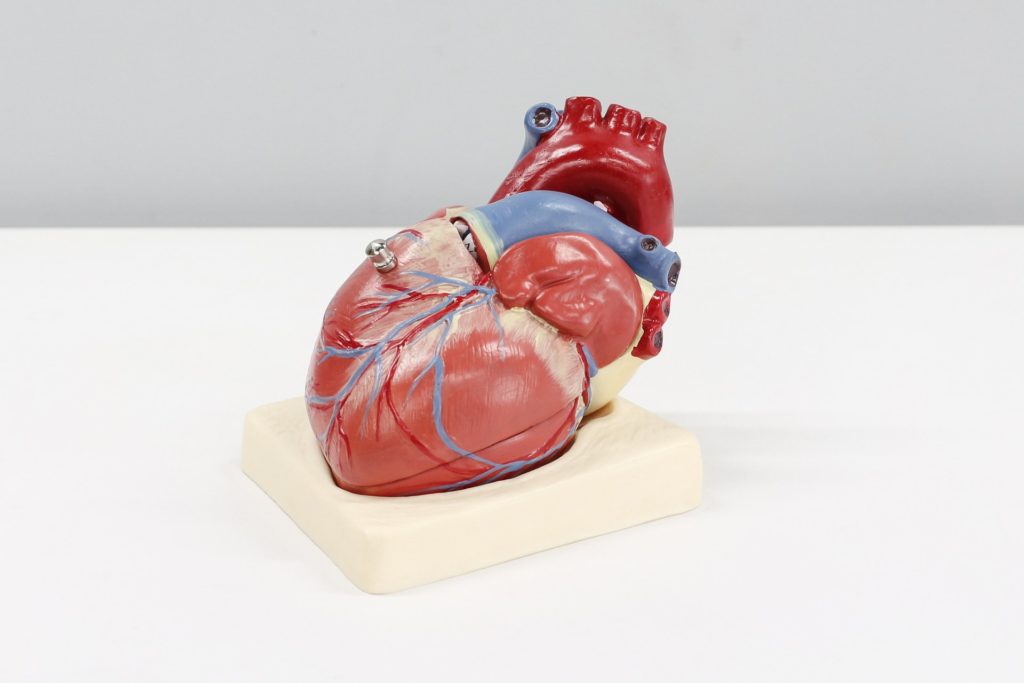There has been a lot of talk about grain-free diets and dilated cardiomyopathy, or DCM for short. There are thousands of articles and research papers talking about their connection, some of them praising grain-free diets and some denouncing them.
What should you believe? Is there a right side to take? Ultimately, you want to feed your dog nothing but the best, but with so much information out there, it’s hard to find clear evidence without falling into an advertising pit.
I want to tackle the biggest questions for you to make your decision easier! I’m going to be as clear as I can, but the heart is a complicated organ. I will explain every medical term and be as black and white as possible. If my explanation isn’t up to par, you can do some of your own research on how the heart works. (It’s an outstanding organ and incredibly interesting to learn about!)

What is Dilated Cardiomyopathy?
What a massive medical term! What does it mean?
In short, DCM is heart disease. If you want to get more technical:
Dilated = expand or enlarge (like the pupil in your eye)
Cardio = heart
Myo = muscle
Pathy = a disorder involving a specific organ or tissue
Sling all those terms together and you’ll sound like a true veterinarian (or a medical doctor)!
But what IS it?
The heart is divided into four main chambers. This disease affects the most important chamber: the left ventricle. It is the main chamber of the heart that pumps blood throughout an animal’s body (and your own!). With this disease, the left ventricle is enlarged (dilated). This causes the heart to stiffen, and it becomes difficult for it to contract and relax to its fullest extent. Not enough blood gets circulated throughout the body and can cause a plethora of problems for the diseased animal.
Symptoms include:
- Various, pathologic heart sounds heard as blood pumps through the chambers/valves (heart murmurs)
- Irregular heartbeat (arrhythmia)
- Fatigue
- Shortness of breath (dyspnea)
- Exercise intolerance
- Swelling in the legs, ankles, feet, or abdomen (edema)
- Congestive heart failure
If you notice any of these symptoms in your own dog, make an appointment to see your veterinarian and explain your concerns. They will most likely want to get some bloodwork done and take radiographs (x-rays) to get a better look at your dog’s heart.
What Does It Mean to be Grain-Free?
We’ve tackled the hardest part: DCM! Now what about a grain-free diet?
When food companies advertise “grain-free,” what they mean is there are no glutenous ingredients in their products. This includes:
- Wheat
- Rye
- Spelt (hulled wheat)
- Triticale (hybrid of wheat and rye)
- Barley
- Oats
- Corn
- Rice
If you take all these ingredients out, how can it possibly be a balanced diet for your dog? There are plenty of other healthy foods that are balanced into grain-free diets. Meat, veggies, fruits, eggs, dairy, legumes, nuts, seeds, sugars, and fats are what fill in the gaps.

Advantages to Grain-Free Diets
Feeding grain-free diets can improve your dog’s gastrointestinal health and activity level at home. It doesn’t cause them to bounce off the walls, don’t worry, but because they’re not bogged down by the carbs in their diet, they may start feeling better and be more active at home.
Grain-free diets are easier to digest. When you ingest carbohydrates, an enzyme called amylase gets to work breaking those carbs down and turning them into sugars your body can use. Amylase is made in the pancreas and the salivary glands. Some dogs have a problem with amylase production or secretion, ultimately leading to a difficulty in digesting carbs. Grain-free diets help moderate this.
Dogs with diabetes may benefit from eating grain-free diets. Like I stated earlier, carbohydrates are broken down into usable sugars by amylase. Because of this, blood sugar levels could spike and cause problems for diabetic dogs. Grain-free diets may help you and your dog maintain a healthy blood sugar level.
Finally, grain-based diets may cause food intolerances or allergies in some dogs. In these intolerant dogs, damage to the lining of the small intestine caused by grains can disrupt proper carbohydrate absorption into the body. Utilizing a grain-free diet will cause less gastrointestinal upsets for these dogs and get them feeling better again. However, it’s important to talk to your veterinarian about intolerances or allergies you think your dog may have.
Disadvantages to Grain-Free Diets
Unfortunately, feeding a grain-free diet means your dog could be missing out on daily fiber, essential amino acids such as taurine (essential meaning your dog cannot synthesize it himself; he needs it from his diet), fatty acids, and protein. Your dog needs all of these things for everyday bodily functions. Otherwise, metabolic problems could arise from insufficient nutrients.
Although grain-free diets are great if your dog has food sensitivities, it’s actually more common for your dog to have meat allergies instead of grain allergies. Don’t get me wrong, anyone can be allergic to anything, but only about 10% of dogs have a grain allergy. Typically, it’s the protein source, such as chicken, beef, or lamb. If you’re worried about food sensitivities, try (gradually) switching your dog’s protein to something easier on the stomach, such as fish or turkey. Talk to your veterinarian, too!
Grain-free foods tend to be more on the expensive side. If you have ever tried to bake without using flour, you know it’s difficult to get everything to stick together. The same idea applies to dog food. Without grains, the kibble doesn’t stick like it needs to, so more ingredients like potatoes and legumes are needed to aid in cohesiveness. This can bump the price of food, in some cases, significantly.
The Connection Between DCM and Grain-Free
By now, I’m sure you’re wondering if I’ll ever get to the main point of this post: do grain-free diets cause DCM?
The experts don’t know!
You read that right. There hasn’t been any significant research that has proven the connection between grain-free diets and heart problems in your dog. What I can tell you is this:
- 93% of dogs diagnosed with DCM had legumes in their diet, which is a major ingredient in grain-free diets
- Feeding grain-free means there will be more filler foods to hold the kibble together
- Most often, it means you are feeding more carbohydrates than with a normal diet
- This can lead to weight problems and – you guessed it – heart problems!
- No one knows your dog better than you. The next human in line would be your veterinarian. Whatever your standpoint on grain-free diets – if they work, if they’re a hoax – no one but you and your veterinarian know what’s best for your dog!

Key Points
- Dilated cardiomyopathy (DCM) is heart disease affecting the left ventricle, causing it to be enlarged and weakened.
- “Grain-free” is a term denoting a diet that does not include any glutenous ingredients.
- Advantages to a grain-free diet:
- Improve gastrointestinal health and activity level
- Easier to digest
- Benefits diabetic dogs
- Benefits dogs with food intolerances and allergies
- Disadvantages to a grain-free diet:
- Diet is missing fiber, essential amino acids, fatty acids, and protein
- Most food allergies are from protein in the diet, not grains
- Expensive
- There is no definitive connection between DCM and grain-free diets.
Our dog has a sensitive gastrointestinal system, and every so often we need a little help from the vet to get him back on track. However, we feed him Purina Pro Plan Chicken and Rice. It’s what works best with his system, and I know it’s a well-balanced diet.
Ultimately, the decision to feed a grain-free diet or not is up to you, the pet parent!
I hope you leave this page with a little more knowledge in your pocket.
Peggy



